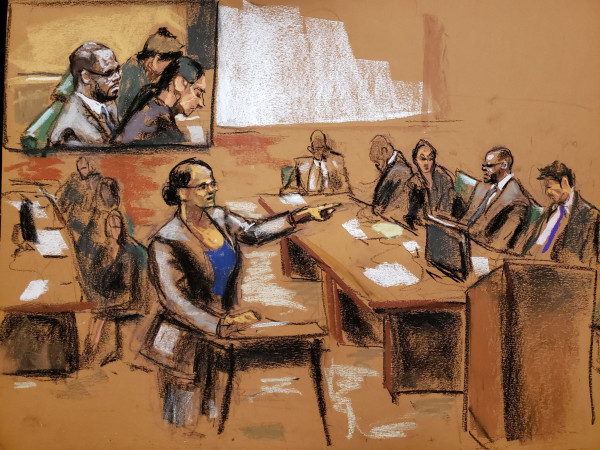Prosecutor Calls R. Kelly A 'Predator' At R&B Singer's Sex Abuse Trial

NEW YORK (Reuters) - R. Kelly is a "predator" who demanded absolute fealty from the many women and underage girls he recruited for sex in a two-decade racketeering scheme, a federal prosecutor said on Wednesday as the R&B superstar's sex abuse trial began.
Assistant U.S. Attorney Maria Melendez told a jury of seven men and five women in Brooklyn federal court that Kelly used "lies, manipulation, threats and physical abuse" to dominate his victims, and often filmed their sexual encounters.
Melendez said Kelly, 54, would require victims to get his permission before doing virtually anything, including going to the bathroom, and blackmail them by threatening to release self-incriminating letters he forced them to write if they fled.
"This case is about a predator," Melendez said in her opening statement. "This case is not about a celebrity who likes to party a lot."
Kelly, a three-time Grammy winner whose songs include "I Believe I Can Fly" and "Bump N' Grind," has pleaded not guilty to a nine-count indictment that also includes accusations of bribery and extortion. He has strongly denied wrongdoing.
Prosecutors will argue that Kelly, whose full name is Robert Sylvester Kelly, used an entourage of managers, bodyguards and others to recruit women and girls, sometimes at concerts, for him to abuse.
They have said Kelly demanded "absolute commitment" from victims, including that they not look at other men and that they call him "Daddy."
Some female accusers, identified by first names or nicknames, and at least one male accuser are expected to testify for the government.
Kelly's legal team has characterized the accusers as "disgruntled groupies" who had pined to be with him, only to change their stories later.
The trial was delayed several times by the coronavirus pandemic and is expected to last about one month.
It is the culmination of years of suspicions and accusations against Kelly, many discussed in the 2019 Lifetime documentary "Surviving R. Kelly," and nearly four years after the start of the #MeToo era.
Kelly has been jailed for more than two years, and could face decades in prison if convicted.
Even if he is acquitted, he still faces sex-related charges in Illinois and Minnesota, where he has also pleaded not guilty.
AALIYAH
The indictment describes Kelly's alleged mistreatment of five Jane Doe victims, Jane Does No. 2 through No. 6, three of whom were underage at the time. One accuser said Kelly engaged in unprotected sex with her without revealing he had herpes.
Melendez said one accuser, Sonya, was sexually abused nearly two decades ago at Kelly's studio in Chicago, where the 22-year-old hoped to interview him for a radio station where she worked.
The prosecutor said Sonya was locked in a room at the studio for three days, and lost consciousness soon after being let out and fed.
Upon awakening, Sonya felt wetness between her legs, saw Kelly fastening his pants, and realized she had been sexually assaulted, Melendez said.
Prosecutors will also try to show Kelly bribed an Illinois official in 1994 to obtain fake identification for the singer Aaliyah, then 15, so that they could marry.
Kelly, according to prosecutors, believed he had impregnated Aaliyah, and hoped a marriage would keep her from having to testify against him.
A marriage license showed Aaliyah's age as 18, prosecutors said. Aaliyah, identified as Jane Doe No. 1 in the indictment, died in a 2001 plane crash.
Eight counts in the indictment allege violations of the federal Mann Act, which makes it a crime to transport people across state lines for prostitution.
Rock and roll pioneer Chuck Berry is among other well-known people convicted under that law. The actor and filmmaker Charlie Chaplin was acquitted of the charge.
Kelly was acquitted of child pornography charges at a 2008 trial in Illinois.
Kelly last released a studio album in 2016. His career stalled following the Lifetime documentary and the latest charges, and Kelly's lawyers said this month his "funds have been depleted."
(Reporting by Brendan Pierson and Karen Freifeld in New York; Editing by Nick Zieminski and Howard Goller)












